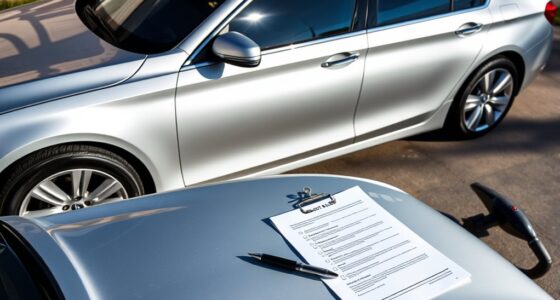To get out of a car lease early, start by reviewing your lease agreement for early termination clauses and fees. Contact your leasing company to discuss options like lease transfers or buyouts, which can reduce penalties. Understand how residual value affects costs, as it influences buyout and penalty amounts. Considering these factors helps you choose the best way to exit your lease without unnecessary expense. Keep exploring to uncover more tips for a smooth exit.
Key Takeaways
- Review your lease agreement for early termination clauses and potential penalties.
- Contact the leasing company to discuss options like lease transfer or buyout.
- Consider transferring the lease to another individual to avoid hefty fees.
- Calculate residual value and market worth to determine if a buyout is financially advantageous.
- Explore flexible solutions with the leasing company to minimize penalties and costs.

Ever wondered what happens if you need to end your lease before the scheduled date? It’s a common concern, and understanding the process can save you money and stress. When you decide to terminate your lease early, you’re likely to face leasing penalties, which are fees or charges imposed by the leasing company for breaking your contract ahead of time. These penalties are designed to compensate the lessor for the loss of expected income and to cover administrative costs. One of the key factors influencing these penalties is the residual value of the vehicle, which is the estimated worth of the car at the end of your lease term. If the residual value is high, breaking the lease early can be more expensive because you might be responsible for the difference between the vehicle’s current market value and its projected residual value.
Generally, leasing penalties are calculated based on how much time remains on your lease and the vehicle’s depreciation. If you’re close to the end of your agreement, penalties tend to be lower. But if you’re several months or years into your lease, expect to pay a significant fee. Sometimes, the leasing company might also charge an early termination fee, which is a flat rate or a percentage of the remaining lease payments. In some cases, you might be responsible for paying the full remaining balance, especially if the lease agreement stipulates such terms. Additionally, understanding the impact of lease residual value can help you evaluate whether early termination is financially feasible.
Leasing penalties depend on remaining lease time and vehicle depreciation, with higher fees for longer-term agreements.
To minimize leasing penalties, you should explore options like lease transfers or buyouts. A lease transfer allows you to find someone else to take over your lease, transferring your contractual obligations and often avoiding hefty penalties. If you’re considering a lease buyout, you purchase the vehicle outright at the residual value. This can sometimes be more economical if the residual value is lower than the current market value of the car. Remember, the residual value plays a pivotal role here because it helps determine your buyout cost and the amount you might owe if you break the lease early.
It’s important to review your lease agreement carefully before taking any action. Some contracts include specific clauses about early termination and how penalties are calculated. You might also want to contact your leasing company directly to discuss your options, as they can sometimes offer flexible solutions or payment plans. Ultimately, understanding the residual value and leasing penalties can help you make informed decisions when facing the need to end your lease early, saving you money and avoiding surprises down the road.
Frequently Asked Questions
Can I Transfer My Lease to Someone Else?
Yes, you can transfer your lease to someone else through a lease transfer. You find a qualified person willing to take over, and your leasing company approves the transfer. Keep in mind, as the original lessee, you remain responsible for the lease until the transfer is complete, so it’s important to verify the new lessee meets all credit requirements. This way, you can avoid early termination fees and transfer your lease responsibly.
Are There Penalties for Early Lease Termination?
Yes, there are penalties for early lease termination. You’ll likely face a hefty lease buyout fee, which can feel like paying for the car twice, plus any remaining payments. The residual value of the vehicle is also a factor, as you’ll need to cover the difference if the car’s worth less than the buyout amount. It’s a costly route, but sometimes necessary if you want out early.
How Does Early Termination Affect My Credit Score?
Early lease termination can negatively impact your credit rating if you miss payments or fail to settle the lease properly. Your lease impact on credit score depends on how you handle the process; timely communication with your lender usually minimizes damage. However, if you default or negotiate a settlement, it could stay on your credit report for years, lowering your credit rating and making future loans harder to get.
What Documents Are Required for Early Lease Termination?
Think of the lease end options as your toolbox for early exit. You’ll need a documentation checklist that includes your lease agreement, proof of financial hardship or employment changes, and possibly a vehicle inspection report. Gather these documents, like collecting keys to release your exit, to smooth the process. Having everything in order makes your early lease termination journey less bumpy and more like a well-planned adventure.
Is Early Lease Termination Cheaper Than Buying the Car Outright?
Early lease termination costs usually outweigh buying the car outright, so it’s often more expensive. While lease termination benefits include avoiding excess wear fees or mileage penalties, you’ll still face early lease costs like surrender fees or remaining payments. If you plan to keep the car long-term, buying may be cheaper. However, consider your situation carefully, as early termination can sometimes be beneficial if you want flexibility.
Conclusion
Breaking free from a car lease early might feel like sailing against the wind, but it’s entirely possible. With the right approach, you can steer your journey back to calmer waters and regain control of your financial voyage. Remember, each step you take is a ripple shaping your future. So, take a deep breath, muster your courage, and navigate your way out—your new horizon awaits just beyond the horizon.










